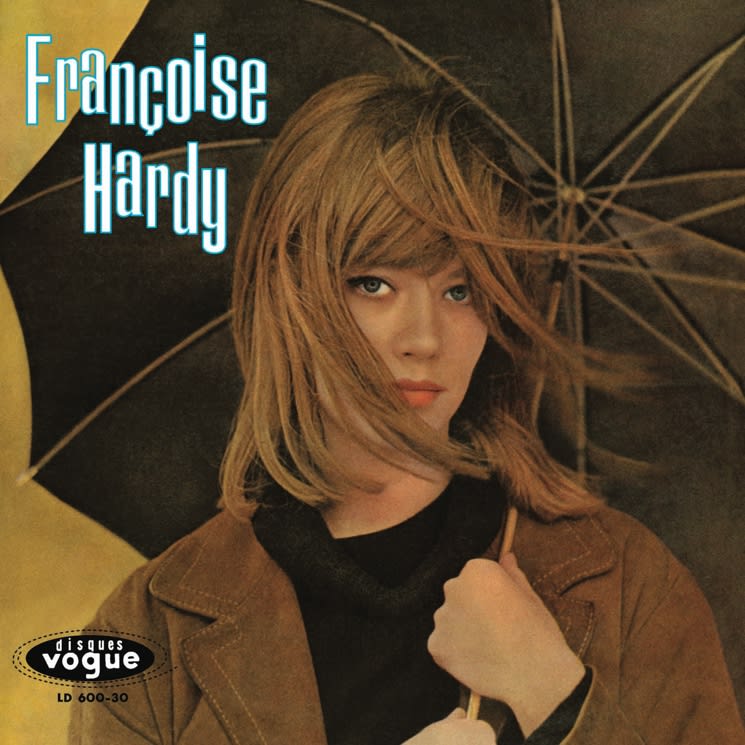When young Parisian Françoise Hardy released her first self-titled record in 1962, at the age of 18, she was unlike other female artists of the time, neither bubbling over with perkiness, nor carefully coiffed. Her voice was seductive but coy, deeper in pitch yet delicate. She wrote and composed the majority of her songs and oozed an effortless cool, both in her songs and style. She became a muse to Bob Dylan (there's a poem in the liner notes on Another Side of Bob Dylan dedicated to her), and kept company with members of the Rolling Stones, the Beatles and the like.
There's no better way to become acquainted with Françoise Hardy than through these first five albums of hers, reissued here on CD by Future Days Recording (a sub-label of Light in the Attic), with LPs to come in January. None of these five albums, released yearly between 1962 and 1966, were titled. Instead, they were unofficially referred to by their most revered songs. They were: 1962's Tous les garçons et les filles, 1963's Le premier bonheur du jour, 1964's Mon amie la rose, 1965's L'Amitié and 1966's La maison où j'ai grandi. Hardy grew from record to record, both as a songwriter and in the literal sense, going from an admittedly shy young lady to an inspiration. She evolved from saccharine lyrics of learning and yearning in love over simply produced arrangements on Tous les garçons (plenty of bright guitars and muted bass), to a decidedly more mature outlook on trials of the heart and the addition of strings on Le premier.
The instrumentation and lyricism also grow in complexity — Hardy displays maturity beyond her years on these records, not unlike Bob Dylan, whom she inspired. Her advancements are most clear on 1964's Mon amie, which includes the booming "Et même" and the ethereal "La nuit est sur la ville," which showcase the strength of her voice and increased experimentation in song structure. L'Amitié includes the haunting "Tu peux bien," with a gorgeous piano melody and vocal work from Hardy, boasting lyrics like "In loving you, the more I lose the more you gain, maybe I want something I don't have, maybe I'll let you go one day" (this is translated from French, of course). La maison features plenty of harpsichord and the beautiful "Si c'est ça," with heart wringing lyrics like "I do not sleep because I am troubled, if what I do is no better than what makes others happy, unhappy... you know, it's like that… that's reality."
Simplicity is satisfying, no doubt, but it can be a difficult thing to achieve in songwriting. From the get-go, Hardy proved herself a master of crafting simple but stellar tracks, and her extensive catalogue proves this to be true. She also excelled at reimagining songs in French, from the fuzzed out "Je n'attends plus personne" (originally "Non aspetto nessuno" by Little Tony), to the very groovy adaptation of Connie Francis's "It's Gonna Take Me Some Time," "On dit de lui."
Hardy remains an icon as both a songwriter and public figure. If you didn't catch her tune "Le temps de l'amour" in Wes Anderson's Moonrise Kingdom, take the time and explore these five flawless records from this chanteuse — and try to resist falling for Hardy.
(Future Days Recording)There's no better way to become acquainted with Françoise Hardy than through these first five albums of hers, reissued here on CD by Future Days Recording (a sub-label of Light in the Attic), with LPs to come in January. None of these five albums, released yearly between 1962 and 1966, were titled. Instead, they were unofficially referred to by their most revered songs. They were: 1962's Tous les garçons et les filles, 1963's Le premier bonheur du jour, 1964's Mon amie la rose, 1965's L'Amitié and 1966's La maison où j'ai grandi. Hardy grew from record to record, both as a songwriter and in the literal sense, going from an admittedly shy young lady to an inspiration. She evolved from saccharine lyrics of learning and yearning in love over simply produced arrangements on Tous les garçons (plenty of bright guitars and muted bass), to a decidedly more mature outlook on trials of the heart and the addition of strings on Le premier.
The instrumentation and lyricism also grow in complexity — Hardy displays maturity beyond her years on these records, not unlike Bob Dylan, whom she inspired. Her advancements are most clear on 1964's Mon amie, which includes the booming "Et même" and the ethereal "La nuit est sur la ville," which showcase the strength of her voice and increased experimentation in song structure. L'Amitié includes the haunting "Tu peux bien," with a gorgeous piano melody and vocal work from Hardy, boasting lyrics like "In loving you, the more I lose the more you gain, maybe I want something I don't have, maybe I'll let you go one day" (this is translated from French, of course). La maison features plenty of harpsichord and the beautiful "Si c'est ça," with heart wringing lyrics like "I do not sleep because I am troubled, if what I do is no better than what makes others happy, unhappy... you know, it's like that… that's reality."
Simplicity is satisfying, no doubt, but it can be a difficult thing to achieve in songwriting. From the get-go, Hardy proved herself a master of crafting simple but stellar tracks, and her extensive catalogue proves this to be true. She also excelled at reimagining songs in French, from the fuzzed out "Je n'attends plus personne" (originally "Non aspetto nessuno" by Little Tony), to the very groovy adaptation of Connie Francis's "It's Gonna Take Me Some Time," "On dit de lui."
Hardy remains an icon as both a songwriter and public figure. If you didn't catch her tune "Le temps de l'amour" in Wes Anderson's Moonrise Kingdom, take the time and explore these five flawless records from this chanteuse — and try to resist falling for Hardy.
